When out shopping do you ever use your smartphone to find a better price? There are lots of smartphone shopping comparison utilities that can scan the item and find it in online stores. Even without any app installed you can simply search for the product you are interested in, using your mobile browser. Bricks and mortar retailers know that this behaviour is becoming more and more common. They call it “showrooming” and it strikes fear into their hearts.
To try and put the brakes on showrooming retailers want to geofence their customers when they enter or get near to the retail premises with their smartphones. The Wall Street Journal details how several US retailers ask customers to sign up for text alerts, then later when the smartphone user is in the vicinity of the store special offers or promotions alerts are sent to their phone. A company that UK residents will be familiar with, The North Face, not only geofenced it’s shops but also outdoor sports and activity areas such as ski resorts and parks. The companies self-limit the number of text alerts so as not to annoy potential customers.

The generic £10 gift voucher above is not valid anywhere, especially not at the HEXUS offices.
The advantage of geofencing technology as used in the US is that it doesn’t need GPS to be turned on or a ‘check-in’ to set off the ‘trip wire’ as your approximate location is gained from mobile mast triangulation. Checking-in apps aren’t mentioned by the WSJ article but these apps are already unbelievably popular. Social networks Foursquare and Facebook have check in options that users seem to enjoy using. Also Google has the Latitude app to “let friends know you’re there” (friends + advertisers who pay Google). Going through these third parties also costs the retailer so the geofencing method would be cheaper and make it possible to offer better incentives and coupons. Smart retailers will use a combination of these location based methods to make more sales.
If I was interested in checking-in in the UK I may be tempted to use the Quidco app. Only yesterday I was forced to trek around the Trafford Centre, Manchester and I could have used it to make a couple of quid for a coffee, possibly. Last year, according to Juniper Research, more than 3.4 billion mobile coupons were redeemed. Smartphone location based shopping apps are definitely big business and will only get bigger with more ‘smart connected devices’ being bought.






